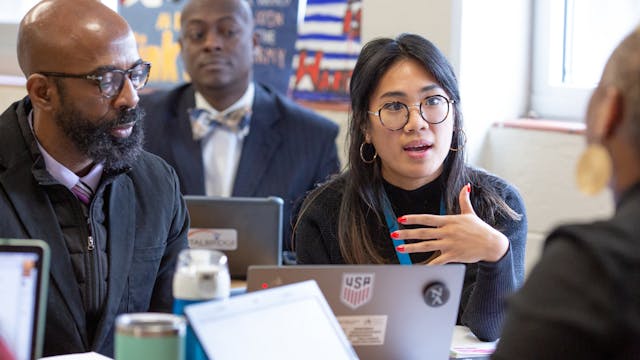In the summer of 2022 as part of the Voices of Change project, EdSurge Research convened 80 Asian American K-12 educators in a series of virtual learning circles to listen to their stories. Our conversations spanned the gamut of topics that are top of mind for educators in all corners of the U.S. these days, including the fallout from COVID-19 and America’s ongoing racial reckoning; teacher burnout, low pay, and systemic teacher shortages; and how best to utilize new tech and curriculum with increasing demands and shrinking professional resources. Overwhelmingly, however, these convenings served as a safe space for Asian American educators to connect with each other about the many subtle and sometimes overt instances of racial oppression they have experienced while working in schools.
For many participants, these small group conversations were the first opportunity they had to gather with other educators like themselves to bear witness to and process the painful and isolating racism they’ve endured, as well as the joys and successes they’ve had in bringing themselves fully to work and in modeling powerful change for their students and other teachers. We are grateful they trusted us and each other with their stories.
Here, we offer two key findings that emerged from these conversations about how K-12 schools can support the well-being and professional development of Asian American educators: 1) Provide ongoing opportunities to participate in identity-affirming professional learning communities, and 2) systemically build diverse Asian American perspectives into curriculum, professional development and school policies.
Identity-Affirming Professional Learning Networks
Overwhelmingly, the 80 Asian American K-12 educators we spoke with described the critical role that identity-affirming and supportive professional community played in their lives. Often on their own, they sought and fostered invaluable, ongoing professional relationships with colleagues and mentors who understood the nuanced intersection of both their everyday racialized experiences and the realities of their educator profession.
These affirming and supportive relationships took many forms, ranging from ad hoc check-ins throughout the school year with two or three trusted colleagues to large-scale organized gatherings with hundreds or thousands at annual educator conferences or in local or national affinity networks (e.g., the Asian/Asian American Caucus of the National Council of Teachers of English; Massachusetts Asian American Educators Association; the Teaching for Justice conference at the University of California, Irvine).
Many also found community online, by following Asian American educators publicly sharing their learnings and resources (e.g., Karalee Wong Nakatsuka; Noreen Naseem Rodriguez; Betina Hsieh; @ericaintheclass; Whitney Aragaki; Virginia Nguyen, Michael Ida); talking to each other through listservs or social media; or participating in digital conversations and programming (e.g., #miseducAsian Twitter/X chats, ongoing digital conversations with a network of justice-oriented Asian Pacific Islander Desi American [APIDA] educators catalyzing liberatory educational change by countering miseducation that silences and obscures Asian American histories and stories).
In these protective spaces, Asian American educators described being able to safely explore and unpack their own ongoing racial identity development while also discussing how to help their students and school communities do the same. They could be playful and joyous; embodied; vulnerable; freely celebrate big and small successes together; work through in-group and intergroup tensions; and readily turn to each other for support and guidance when facing racism, gun violence, mental health crises and other challenging incidents in their schools and communities.
They also spoke about the difference that supportive leadership made. How having dedicated time and resources to participate in these communities helped them prioritize their own continued development as educators of color and served to further ground them in the profession. This kind of tangible support from school leaders directly bolstered their well-being and resilience in the face of a tumultuous social climate, devaluation of their skills and work, and the looming burnout, stress and demoralization that so many educators in this country face.

Diverse Asian American Perspectives In Curriculum, Professional Development and School Decisions
The Asian American educators we spoke with were hyper-aware that their very presence in their school communities already made a deep representational difference in the lives of their students, and all of them took the pressures of that responsibility seriously. However, many also reported feeling overwhelmed and ill-equipped to protect students from the racialized taunting, microaggressions and trauma that both they and their students were navigating on a regular basis even before it reached a fever pitch in the wake of heightened waves of anti-Asian hate speech and targeted acts of violence across the U.S. after COVID-19. They recognized that virulent racialized scapegoating is a pattern in this country, like when the federal government forced Japanese Americans into internment camps during WWII or when post-9/11 Islamophobia targeted anyone perceived to be Muslim, including Arab and South Asian Americans. It’s a template likely to reemerge in the future, for themselves or other marginalized groups, whenever the country experiences its next significant stressor.
They said that it would help to have specific curricular resources, reflexive school policies and ongoing opportunities for professional learning so educators of all backgrounds can understand how historical tropes and the racialized positioning of Asian Americans in the U.S. impacts the everyday lives of students and educators.
Asian American educators need to be able to rely on school systems proactively standing up structures to integrate diverse Asian American perspectives into curriculum, professional development and school policies, so that they feel less like they’re doing it piecemeal, on their own. In our study, countless respondents said they felt like they were the lone “parrot” at their schools, constantly the sole voice advocating for otherwise forgotten Asian American students; scouring the web for hours of their own time looking for scant curricular resources; or being the only one to recognize and point out blatantly damaging stereotypes in curriculum and school policies for their diverse students.
Many also described how it’s often more painful and frustrating when the invisibility and marginalization of Asian Americans occurs during professional meetings with colleagues, and especially so in conversations about diversity, equity and inclusion (DEI), which they expect to be more conscious and inclusive but in fact end up causing further erasure and harm instead by excluding, overlooking, dismissing or further marginalizing their voices and experiences. This is why it’s important that all educators — not just Asian Americans — have access to ongoing professional learning and quality resources that humanize and put into perspective diverse Asian American experiences and stories.

If the charge of educators is to help students make sense of the world and their place in it, educators need to be systematically and consistently supported in doing the same. They can only do this if they have the room to do it themselves, too, at all stages of their educator journeys. This goes from before they ever step into a classroom or school building as an educator, all the way to how they are supported once they get there.
In a time of teacher, principal and school counselor shortages, and with recruitment and retention of these professionals declining at an alarming rate, intentionally creating a work environment that sees and honors educators as their whole selves is imperative.


